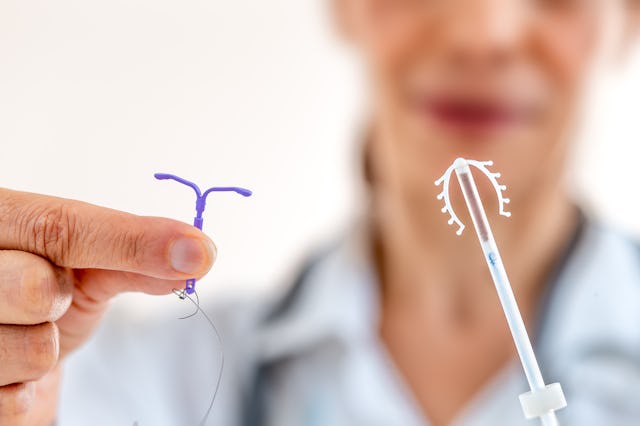Could IUDs Be Criminalized? Experts Explore The Concern Surrounding These Contraceptive Devices
Vague language in bills related to abortion and reproductive healthcare has sparked a conversation about possible future bans.

Now that Roe v. Wade has been overturned, questions about access to reproductive care abound. The ripple effects of Roe's repeal could be wide-reaching, especially given that conservative Supreme Court Justice Clarence Thomas suggested that the Supreme Court "should reconsider" past rulings on rights to birth control access in his concurring opinion.
That assertion — paired with the broad and vague language used in some of the strictest bills related to abortion and reproductive care put forward by lawmakers in certain states — means that access to certain forms of birth control like intrauterine devices (IUDs) and emergency contraception like Plan B might be at risk. If you currently have an IUD or are thinking about getting one in the near future, here's everything you need to know about your IUD.
How are IUDs related to abortion?
When it comes to foolproof birth control (ahem, no more "Crap, did I take my pill yet?" moments), plenty of people love IUDs, a small, T-shaped plastic device inserted into the lining of the uterus by a doctor. Not only are they a safe, effective contraceptive method, but they also last for years and come in hormonal and non-hormonal options made of copper. They can be inserted at any time during your cycle, and plenty of new parents have them inserted immediately after giving birth, making for one less thing to worry about amid navigating life with a newborn.
You're likely wondering what an IUD has to do with abortion. Some anti-choice lawmakers hold the belief that life begins at the moment of fertilization. That makes contraceptive methods like the IUD a target since IUDs prevent the implantation of a fertilized egg in the womb, as NBC News explains. Despite decades of researchers and health experts noting that IUDs are contraceptives and not abortifacients (aka medications that cause abortions), some lawmakers are now trying to argue against them and prevent providers and patients from using them.
"Unfortunately, some anti-abortion activists continue to conflate forms of contraception like emergency contraception and IUDs with abortifacients," says Stephanie Swartz, Favor's Senior Director, Policy & Public Affairs. "It's important to note that this is not the case — IUDs and emergency contraception do not cause abortions, but they instead prevent pregnancy from taking place. That said, anti-abortion activists and policymakers sometimes seek to define pregnancy, and thus life, at fertilization — since IUDs can stop a fertilized egg from implanting in the uterus but don't always stop fertilization, this definition can lead to deliberately crafted confusion about when a pregnancy begins."
Could patients be targeted for their IUDs?
Now that Roe has been repealed, so much about reproductive care remains up in the air, and it seems plenty of lawmakers and activists who fall in the conservative, anti-choice, and/or evangelist camps are hellbent on targeting as many people as possible in their advocacy work.
So far, no states have explicitly banned any specific forms of birth control, including IUDs. But Roe has certainly set a precedent for state legislators, who would have to create separate laws to actually ban particular birth control methods. "While it's unclear if any specific laws will be enacted to criminalize patients who have IUDs and providers who facilitate IUD insertion, Justice Thomas's concurring opinion in the Dobbs case indicated that access to birth control may be up for debate in future Supreme Court cases," says Swartz. "Unfortunately, the reversal of Roe v. Wade indicated that reproductive rights beyond access to an abortion are likely to come under attack in the coming years, including access to forms of contraception like IUDs."
Some states have indicated a push toward birth control bans, such as Idaho and Missouri, where conservative representatives have already attempted to pass restrictive bills into law. Louisiana already has passed a bill that says that "human personhood" starts at fertilization, language which could potentially be used to outlaw IUDs and emergency contraception in the future, making it a homicide to provide or use abortion or these birth control methods in the state.
Is it time to panic yet?
Not yet. On Friday, July 8, President Joe Biden signed an executive order that, among other protective measures, included directives to establish a task force on safeguarding reproductive health.
Swartz also notes that checking in with your doctor is your best bet. "If you currently have an IUD, I don't recommend any immediate action right now beyond continuing to stay up-to-date on legislation around contraceptive access in your state," she says. "If you're hoping to get one in the future, I recommend continuing to plan to do so, too. If you have any questions about access to an IUD and how this may change in the coming months, speak to your doctor, who can provide you with insights specific to your state and circumstances."
So much is still uncertain, but you have every right to complete and total autonomy over your reproductive choices — whether they include abortion or any type of birth control you prefer. There are so many health experts, doctors, and activists on your side, and they're doing all they can to counteract the push backwards from their anti-choice counterparts.